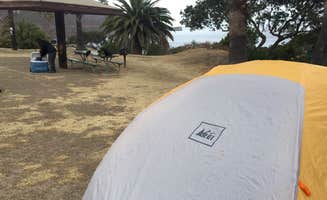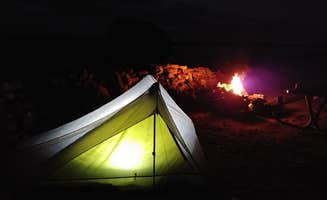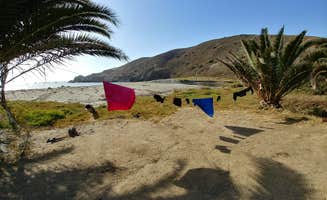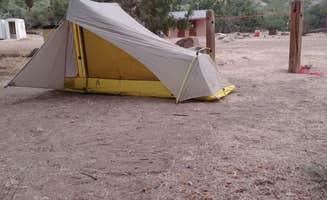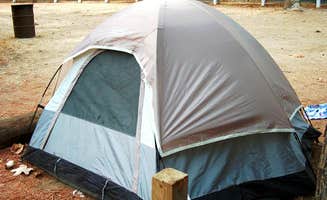Tent camping on Catalina Island offers rugged wilderness across an elevation range from sea level to 2,097 feet at Mt. Orizaba. The island's Mediterranean climate creates distinct microclimates between coastal and inland campsites, with temperatures varying by up to 15°F between beaches and higher elevations. Seasonal winds can be particularly strong at coastal sites from November through February, requiring proper tent anchoring.
What to do
Snorkeling and diving: Clear waters at Two Harbors Campground provide excellent marine exploration opportunities. "The water in the harbor is super clear. We kayaked around the area and loved it," notes Corey B., who also mentions the wildlife encounters: "At night we had deer walking directly through our site as we were eating dinner (seriously on a few feet away)."
Hiking the Trans Catalina Trail: The trail connects multiple campgrounds across varied terrain. "You can hike back in town which is about 1/4 miles away from the site," reports Roland B. about Two Harbors. At Black Jack Campground, Sarah M. notes, "Great first campsite of the trans-Catalina trail. Each site has a picnic table and fire pit. You have to find or bring in your own wood for the fire."
Buffalo spotting: The island's bison population frequently visits certain camping areas. "Bison frequent the area so give them their space," warns Mandy E. about Black Jack Campground. Buffalo sightings often occur in the early morning or evening hours when they're most active.
What campers like
Remote beach access: Parsons Landing Campground offers direct beach camping that's highly rated. "One of the most amazing campgrounds I've ever stayed at. You're on a sandy beach with waves crashing on the shore. There's only a handful of sites, so try to book this early," writes Luis N. Kate W. adds: "Parson's Landing is a super unique campground. I would say it's the only TRUE beach camping I've ever been able to find."
Wildlife encounters: Native species frequently visit campsites across the island. Jonathan K. at Hermit Gulch Campground shares, "There is an added bonus that I felt that made this campground unique to others that I've been to, which is there is sooooo much wildlife the frequently visits the campground. In one day we saw deer, quail, woodpeckers and the famous Catalina fox."
Solitude at certain sites: Less crowded camping options provide more private experiences. "Such a beautiful campground, and if you're lucky enough (like we were) you may get the whole place to yourself. The beach is beautiful, and there's nothing like the sunsets here," describes Morgan F. about Little Harbor Campground.
What you should know
Water access varies: Not all campgrounds provide potable water. At Parsons Landing, "No water on site, you must bring your own. Water, firewood, and fire starter are available for purchase. You can buy them at two harbors, which is where they will give you a key for a locker that is at parsons landing," explains Luis N.
Wildlife protection requirements: Island animals can be persistent around food. Mandy E. cautions about Parsons Landing: "The birds there are relentless and will poke holes in everything including water jugs if you turn your back for even a second. They even know how to get into unlocked lockers."
Transportation logistics: Reaching campsites requires planning. Kate W. notes about Parsons Landing: "You have to coordinate the ferry to Two Harbors on Catalina Island and then hike about 8 miles to the far end of the island. It's not a bad hike, just long and around the perimeter."
Weather considerations: Fog and wind can impact camping comfort. Sarah M. observes at Black Jack Campground: "Thick fog soaks everything so use the gear box overnight to keep your stuff dry."
Tips for camping with families
Ease of access: Musch Trail Camp offers an easier hike-in option for families with children. "Musch Camp is an easy one mile hike from from the Trippet Ranch Parking Lot in Topanga State Park," notes Erik M. Another reviewer adds, "It's an easy hike and very quiet."
Cost factors: Budget for per-person fees rather than per-site costs. Hayley K. explains about Two Harbors: "The sites are pretty expensive and charge by the person. $27-$29 (Winter-Summer pricing) for each person with a $10 reservation fee."
Shower facilities: Only certain campgrounds offer showers. "The campground offered easy access to the beach and delivered fire wood and water for a reasonable fee," notes Katie R. about Two Harbors, while Jonathan K. advises about Hermit Gulch: "Showers only take quarters so make sure to bring quarters (1 quarter = 1 minute)."
Noise considerations: Some campgrounds experience more traffic noise. Jonathan K. recommends at Hermit Gulch: "I reccomend reserving a campsite near the back of the campground as there is more tree cover for shade and it gets you farther away from the main road that receives alot of loud golf cart traffic and can be extremely noisy (usually from 8am-4pm)."
Tips from RVers
Size limitations: Catalina Island camping is primarily tent-focused with limited RV access. Jon C. notes about Little Harbor: "Took the ferry from San Clemente to Avalon (45 mins to 1 hour). Then a bus from Avalon to the campsite (1 to 1.5 hours depending the stop at the airport). Went with a group and had to carry all your equipment and food for the weekend."
Storage considerations: Proper gear storage is essential due to wildlife. Lacie G. advises about Parsons Landing: "Make sure you secure your food. The squirrels and birds are ridiculous. They'll chew right through your pack to get your stuff. If you have a bear canister I'd make sure to bring it."
Supply planning: Limited access requires careful supply management. Jon C. explains about Little Harbor: "Any last minute food items can be bought at the small grocery store in Avalon, but you'll pay for it. Once you leave Avalon, you are at the mercy of the bus schedules in order to get back to a store, which buses only come by the campsite a limited amount of times through the day or week."


